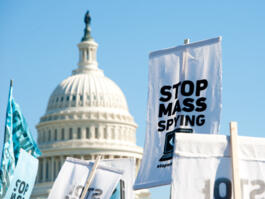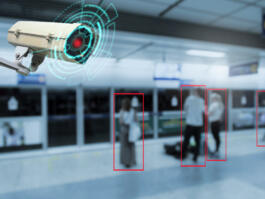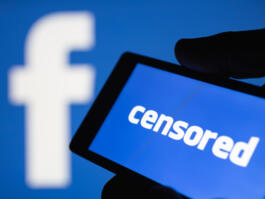Government Spying On Journalists? Most Voters Think So
Fox News host Tucker Carlson made headlines last week when he accused the federal government of spying on him, but most voters think such surveillance is likely.
A new national telephone and online survey by Rasmussen Reports, sponsored by Ron Coleman and Coleman Nation, finds that 59% of Likely U.S. Voters believe it is at least somewhat likely that the U.S. government spies on critical journalists and political opponents, including 36% who think it’s Very Likely. Twenty-one percent (21%) of voters don’t think it’s likely the government is spying on opponents, and 20% are not sure. (To see survey question wording, click here.)
After Carlson said on his June 28 broadcast that the National Security Agency was intercepting his communications, many news organizations dismissed this claim as implausible. However, most voters have long believed the U.S. government spies on political opponents – in January 2019, 61% thought such surveillance was at least somewhat likely.
Among those who believe it’s likely the government spies on critical journalists and political opponents, 61% don’t trust the government’s judgment in such surveillance on U.S. citizens.
(Want a free daily e-mail update? If it’s in the news, it’s in our polls). Rasmussen Reports updates are also available on Twitter or Facebook.
The survey of 1,000 U.S. Likely Voters was conducted on June 30-July 1, 2021 by Rasmussen Reports. The margin of sampling error is +/- 3 percentage points with a 95% level of confidence. Field work for all Rasmussen Reports surveys is conducted by Pulse Opinion Research, LLC. See methodology.
Sixty-six percent (66%) of Republicans, 52% of Democrats and 57% of voters not affiliated with either major party believe it’s at least somewhat likely the U.S. government spies on critical journalists and political opponents.
Significantly more Republicans (44%) than Democrats (25%) or unaffiliated voters (38%) now consider such surveillance Very Likely. When Donald Trump was president in January 2019, however, more Democrats than Republicans believed it was Very Likely the government was spying on critical journalists and political opponents.
Younger voters are more likely than their elders to believe the U.S. government has its opponents under surveillance. Seventy-two percent (72%) of voters under 40 say it’s at least somewhat likely the government is spying on critical journalists and political opponents, compared to 56% of those ages 40-64 and 46% of voters 65 and older.
More men than women think the government is spying on domestic opposition.
Fifty-five percent (55%) of whites, 50% of black voters and 76% of other minorities believe it’s at least somewhat likely the government is spying on critical journalists and political opponents.
College graduates are more likely than those with a high school education to believe the government spies on political opponents, but those with graduate degrees are less likely to believe it.
President Joe Biden’s strongest supporters are less likely to think the federal government is spying on Americans. Thirty-nine percent (39%) of voters who Strongly Approve of Biden’s job performance as president believe it’s at least somewhat likely the government is spying on critical journalists and political opponents, whereas among voters who Strongly Disapprove of Biden’s performance, 75% think it’s likely the government is conducting such surveillance.
In January, before Biden was inaugurated, most voters were concerned about the government spying on U.S. citizens, and many were worried such surveillance would increase under the Biden administration.
Most Americans believe that surveillance cameras reduce crime and increase public safety, and less than a third worry that they’re being spied on.
Additional information from this survey and a full demographic breakdown are available to Platinum Members only.
Please sign up for the Rasmussen Reports daily e-mail update (it’s free) or follow us on Facebook. Let us keep you up to date with the latest public opinion news.
The survey of 1,000 U.S. Likely Voters was conducted on June 30-July 1, 2021 by Rasmussen Reports. The margin of sampling error is +/- 3 percentage points with a 95% level of confidence. Field work for all Rasmussen Reports surveys is conducted by Pulse Opinion Research, LLC. See methodology.
Rasmussen Reports is a media company specializing in the collection, publication and distribution of public opinion information.
We conduct public opinion polls on a variety of topics to inform our audience on events in the news and other topics of interest. To ensure editorial control and independence, we pay for the polls ourselves and generate revenue through the sale of subscriptions, sponsorships, and advertising. Nightly polling on politics, business and lifestyle topics provides the content to update the Rasmussen Reports web site many times each day. If it's in the news, it's in our polls. Additionally, the data drives a daily update newsletter and various media outlets across the country.
Some information, including the Rasmussen Reports daily Presidential Tracking Poll and commentaries are available for free to the general public. Subscriptions are available for $4.95 a month or 34.95 a year that provide subscribers with exclusive access to more than 20 stories per week on upcoming elections, consumer confidence, and issues that affect us all. For those who are really into the numbers, Platinum Members can review demographic crosstabs and a full history of our data.
To learn more about our methodology, click here.





